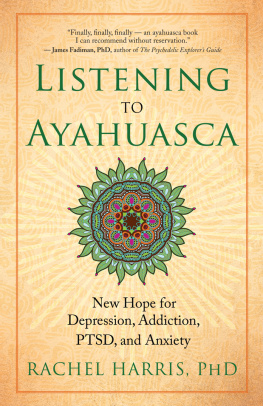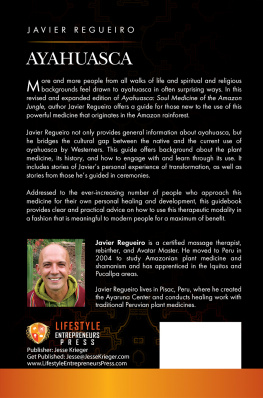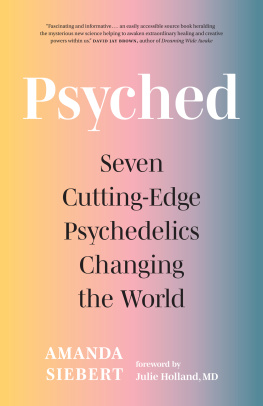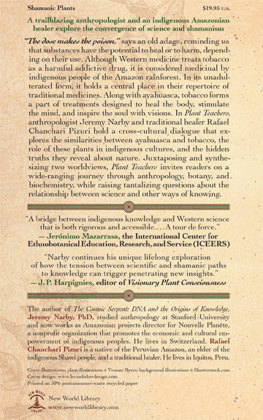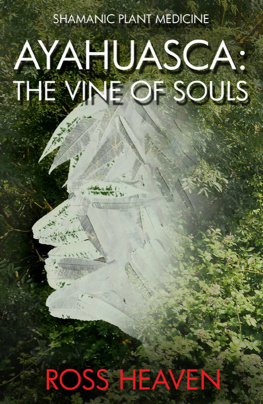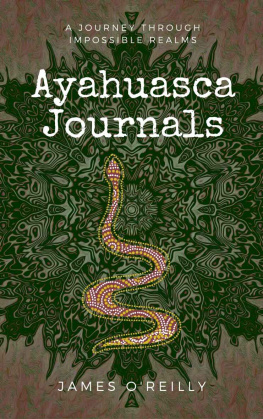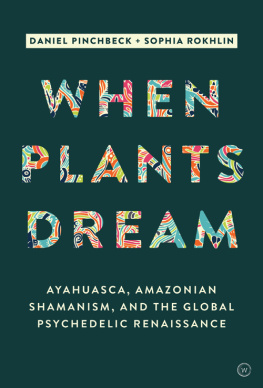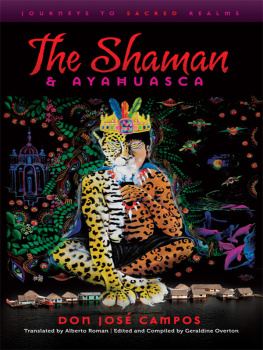Praise for Listening to Ayahuasca
With heart and clarity, Listening to Ayahuasca invites us to listen deeply and carefully to what Grandmother Ayahuasca has to tell us. Sharing the results of her in-depth and carefully designed research on the ayahuasca underground in North America, psychotherapist Rachel Harris, in her inevitably insightful, warm, and nuanced way, introduces her readers to what people do, what they experience, and how they are transformed when they choose to respectfully drink this mysterious mind-altering and spiritually potent entheogenic brew. Courageously self-revealing, Harris also openly shares her own struggles to make sense of the psychological, and even metaphysical, implications of her powerful ongoing interactions with ayahuasca. In Harris we have a guide we can trust: someone who for years has actively immersed herself in a wide variety of ritual ayahuasca contexts; who has thought long and hard about the shadow side of taking ayahuasca; and who does not let the all-too-human aspects of the ayahuasca experience undermine her willingness to underscore the potentially life-changing therapeutic potential of this powerful substance. With humor, care, and (it must be said) wisdom, Harris invites us to join her as she walks, eyes wide open, into the enchanted and wondrously thought-provoking world of Grandmother Ayahuasca.
G. William Barnard, professor of religious studies at
Southern Methodist University and author of
Exploring Unseen Worlds:
William James and the Philosophy of Mysticism
If you are interested in any aspect of psychedelics, I emphatically recommend Listening to Ayahuasca. Writing with a long history both as a participant in healing ceremonies and as a very skilled therapist, Harris shows a deep awareness of this long-revered plant medicines potential in helping patients not only heal difficult psychological problems but also, with proper guidance, integrate the experience into fuller emotional and spiritual dimensions. Her book offers a fresh perspective on how people who partake of the plant brew can find a deeper, lasting benefit with the addition of follow-up sessions with a skilled therapist who understands the full potential of the medicine. In a masterful and pleasurable-to-read presentation, Harris shows how ayahuasca reaches deeper areas, such as the dying process, communication with entities and ancestors, a fuller appreciation of people and the planet, and the emotional balm for individuation; she shows how it can help heal the core issue that most of us share, the underlying yearning to be loved and accepted.
George Douvris, author of Crossing Karma Zones
Finally, finally, finally an ayahuasca book I can recommend without reservation. Rachel Harris focuses not on the journey (giant snakes, dismemberment, insights, purging, etc.) but on what eventually matters far more: the ongoing and robust aftereffects in peoples lives. Harris is a skilled psychotherapist and a serious ayahuasca user, and her credibility in both worlds makes her own story, interwoven with those of the many people she interviewed, informative and discerning. While remaining deeply committed to accurate reporting about the amazing healings and benefits that can come about with careful, properly run, and (usually) repeated ceremonies, she is critical of some practices and practitioners, and even facets of her own psyche, all with good reason. I especially appreciated her descriptions of the vast differences between ayahuasca use in the rapidly expanding churches and its use by shamans, highlighting the major effects of situation and anticipation in using this physically overwhelming substance. A necessary book for any novice and a compelling book for anyone in an ongoing relationship with Mother Ayahuasca.
James Fadiman, PhD, microdose researcher and author of
The Psychedelic Explorers Guide:
Safe, Therapeutic, and Sacred Journeys
This book provides an excellent resource for anyone looking to expand their horizons regarding ayahuasca. Part memoir and part research report, it covers many interrelated and far-reaching facets of the ayahuasca phenomenon, including valuable material on subjective effects and psychological integration, and serves as a useful primer on contemporary ayahuasca use. Rachel Harris delivers a refreshingly honest, balanced account of the complex literature concerning ayahuasca, discussing potential risks alongside purported benefits and allowing room for the sometimes extraordinary and mysterious experiences reported by initiates. At once accessible and well informed, this work represents a much-needed guidepost for health professionals who may encounter ayahuasca users in their practice, as well as for spiritual seekers with an interest in entheogens.
Albert Garcia-Romeu, PhD,
Behavioral Pharmacology Research Unit,
Johns Hopkins University School of Medicine
Spirituality comes in a wondrous variety of forms. Here in the West, the range of practices has always been broader than people realized, and it has been expanding rapidly since the 1960s. One category of practice, persistent over the eons, has been the ingestion of mind-altering substances to induce spiritual experience. Ayahuasca is the latest to achieve currency among spiritual explorers, and with that popularity come not only promise but risks of various kinds. In that context, this book by a responsible psychologist is most welcome. Rachel Harris brings to it the perspective of an astute observer, the rigor of a scientist, the compassion of a therapist, and the insight that only a participant can offer. Anyone contemplating an ayahuasca experience, or who counsels such a person, would be well advised to first consult this profound and important book.
Philip Goldberg, author of American Veda:
From Emerson and the Beatles to Yoga and Meditation
How Indian Spirituality Changed the West
In Listening to Ayahuasca, Dr. Rachel Harris presents a well-rounded, reader-friendly account of a sacramental tea from the Amazon rain forest that has gained considerable attention because of its mind-altering (and sometimes life-altering) effects. Combining her own experiences with those of people she has interviewed, Harris comes to the cautionary conclusion that this jungle brew might be effectively used in the treatment of addiction, anxiety, depression, and a host of other maladies. She makes it clear that ayahuasca is not a panacea, that it does not work for everyone, and that there are risks involved for users in both a South American shamanic setting and in one of the North American churches where the beverage can be consumed legally. Harris has kept tabs on those she has interviewed, and most of their follow-up stories are both positive and impressive. Anyone considering visiting Grandmother Ayahuasca for the first time needs to read this book before making a decision. Harris is not an advocate, and her book is not a polemic; however, it seems clear that this plant medicine has the power to transform some peoples lives in ways that seem to be filled with the magic and mystery so sadly missing from our overly civilized world.
Stanley Krippner, PhD,
Alan Watts Professor of Psychology at Saybrook University,
coauthor of Personal Mythology,
and coeditor of Varieties of Anomalous Experience
An excellent book on the therapeutic potential of ayahuasca; clearly written and well researched, it is an important addition to the literature on the subject.
Jeremy Narby, PhD, author of
The Cosmic Serpent: DNA and the Origins of Knowledge
Rachel Harris has produced a uniquely brave study of ayahuasca use and users, through the experiences of others and, most significantly, her own explorations. She never dodges the big questions (Who or what is the guiding intelligence experienced?) or comes up with static answers. Instead, she moves through the mysterious process of self-encounter, sharing a string of hard-won insights into how ayahuasca can work its magic to relieve human suffering.
Next page
